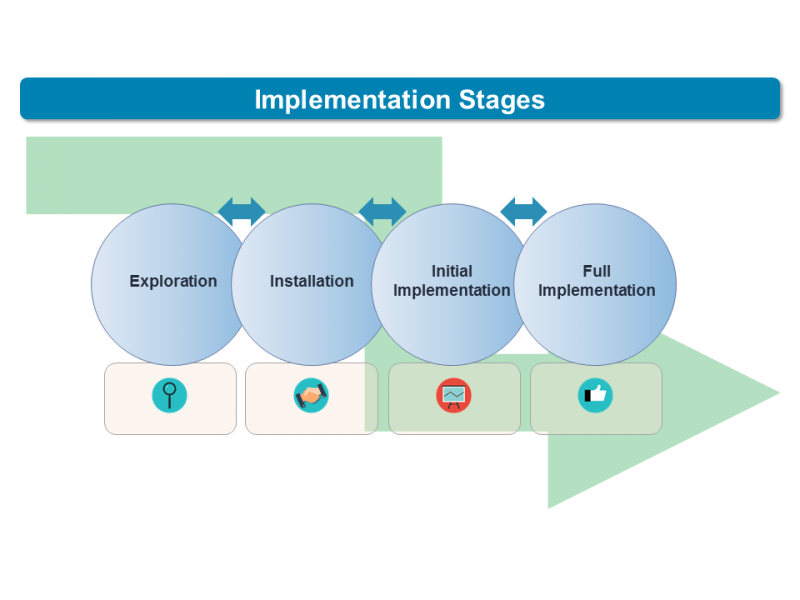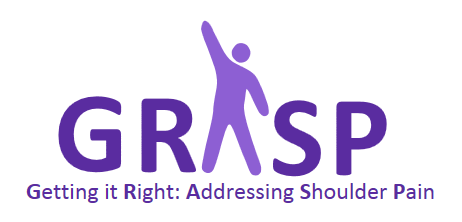The PRS recently hosted our 2023 conference in Manchester with the theme ‘Implementation and Impact’. The audience were treated to an array of keynote speakers sharing their insights into implementation research and successful examples in practice (if you are a PRS member, please follow link for access to further resources). How research findings and innovation are implemented is something that should be considered early in the research journey, with engagement of stakeholders along the way to help maximise impact.
In this article we briefly outline:
1 What implementation research is
2 Highlight an example of implementation from the GRASP trial team, who have just launched an open access course on the interventions (course link: https://t.co/RZQMTrwRVt)
3 Outline some of our top tips on implementation of trial interventions
1 Implementation – what is it and why is it important?
A primary aim of healthcare research is to influence practice to benefit patients. There is a widely reported time lag of 17 years for health research to translate into practice (Balas et al., 2000; Grant et al., 2000; Morris et al., 2011). Implementation research is a rapidly growing research area designed to mitigate this delay, and is defined by Peters et al., (2014) as:
“… the scientific inquiry into questions concerning implementation—the act of carrying an intention into effect, which in health research can be policies, programmes, or individual practices (collectively called interventions).” (Peters et al, 2014).
The National Implementation Research Network (2013-2019) outline a four-stage implementation process, valuable for both researcher and clinician to consider adopting:

Image from: National Implementation Research Network from the University of North Carolina, Chapel Hill. This NIRN materials is used under a creative commons license under which others are permitted to copy and redistribute the works for noncommercial purposes with appropriate attribution. https://nirn.fpg.unc.edu/module-4/topic-1-implementation-stages-overview/what-are-stages, accessed on 04.05.23
The exploration phase starts early in the research journey, where readiness for change is assessed and optimised ahead of discovery of research findings. Installation involves planning implementation, developing resources and preparing staff and stakeholders, as well as gathering feedback on initial learning relating to the innovation.
Initial implementation involves the first use of the innovation or intervention by practitioners; potentially skills and approaches may be new to the practitioners and organisation. Close monitoring and analysis of progress and learning is undertaken with a view to develop improvement strategies to streamline the learning and integration process with the support of an implementation team. This process will always be unique and very much dependent upon the innovation, skills required, and factors influencing the change process which may be specific to the organisation, practitioners and service users. Full integration is achieved when the innovation is well accepted into practice. This may be supported by successive programs and driven by leadership from the implementation team.
2 The GRASP trial

The GRASP randomised controlled trial conducted at the University of Oxford was published in the Lancet in 2021. https://www.thelancet.com/journals/lancet/article/PIIS0140-6736(21)00846-1/fulltext The trial found no evidence of a difference between a single GRASP best practice advice session with a physiotherapist compared with a physiotherapy intervention of up to six face-to-face sessions for people with rotator cuff-related shoulder pain.
The GRASP trial - Implementation
A new online course has just been released by the GRASP team https://t.co/RZQMTrwRVt. There are free access registration options. Dr David Keene from the GRASP team said: ‘Developing and testing the GRASP interventions was only possible through collaborative work between hundreds of physiotherapists. We are delighted to now share the intervention training and materials to support implementation beyond the trial. It has been really exciting in the first week since the launch, with physios from around the world signing up to the course’.
3 Top tips for implementation of trial interventions
- Involve patients and a range of clinical stakeholders from the very beginning of intervention development
- Carefully assess barriers and facilitators within the trial to inform later implementation
- Ensure interventions are scalable across the health system in terms of resources and training required
- Enable access to training and materials after the trial to support health professionals to use the intervention in a way that is consistent with what was done during the study
- Embed research into the implementation phase to understand how the implementation approach is progressing and what refinements may be needed
Further Resources:
National Implementation Research Network https://nirn.fpg.unc.edu/about-us
Active Implementation Research Network https://www.activeimplementation.org/
Written by Caroline Coulthard and David Keene
References:
Balas E, Boren S. Managing Clinical Knowledge for Health Care Improvement. In: van Bemmel JH, McCray AT, eds. Yearbook of Medical Informatics. Stuttgart: Schattauer Verlagsgesellschaft mbH, 2000:65–70.
Grant J, Cottrell R, Cluzeau F, Fawcett G. Evaluating "payback" on biomedical research from papers cited in clinical guidelines: applied bibliometric study. BMJ. 2000;320(7242):1107-11.
Hopewell, S., Keene, D.J., Marian, I.R., Dritsaki, M., Heine, P., Cureton, L., Dutton, S.J., Dakin, H., Carr, A., Hamilton, W. and Hansen, Z. Progressive exercise compared with best practice advice, with or without corticosteroid injection, for the treatment of patients with rotator cuff disorders (GRASP): a multicentre, pragmatic, 2× 2 factorial, randomised controlled trial. The Lancet. 2021;398(10298):416-428. https://doi.org/10.1016/S0140-6736(21)00846-1
Morris ZS, Wooding S, Grant J. The answer is 17 years, what is the question: understanding time lags in translational research. Journal of the Royal Society of Medicine. 2011;104(12):510-520. doi:10.1258/jrsm.2011.110180
National Implementation Research Network (2013-2019). Module 4: Implementation Stages ‘What are implementation stages’. The University of North Carolina, Chapel Hill. https://nirn.fpg.unc.edu/module-4/topic-1-implementation-stages-overview/what-are-stages
Peters DH, Adam T, Alonge O, et al Republished research: Implementation research: what it is and how to do it. British Journal of Sports Medicine. 2014;48:731-736.
